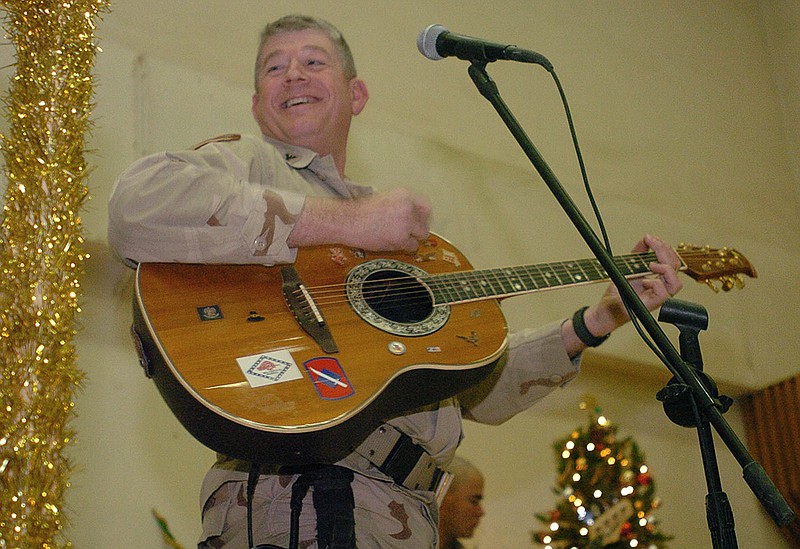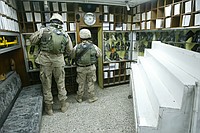Like many Americans of his generation, John Reinold absorbed the carnage of 9/11 in real time from a classroom.
The Dover High senior's mythology teacher had just turned on the television when footage showed an airplane strike the World Trade Center in New York City.
Anger took hold.
"We saw a plane fly directly into that second tower," Reinold, who was 17 at the time of the attacks, said in a recent interview. "And I got so mad. I remember I gripped my fist. I stared at that TV. Even today, I remember that feeling."
Feeling a "personal responsibility" to fight for his country, the 6-foot-4-inch, 350-pound offensive lineman strongly considered dropping out of high school that day to enlist in the military. He decided to finish school, but his sense of duty did not abate.
Reinold signed up a year later with the Arkansas National Guard, a first step toward becoming one of more than 1 million part-time civilian soldiers who were activated alongside full-time military forces in the war on terror -- the culmination of the nation's increased reliance on civilians to fight its battles.
[GALLERY: Historic photos of the 39th Infantry Brigade » arkansasonline.com/98guard/]
Enlistments in the National Guard "spiked" amid a wave of patriotism that followed the Sept. 11, 2001, terrorist attacks, and a renewed and refocused Guard has emerged in the past two decades, said retired Col. Mike Ross, who led Arkansas Guardsmen into Iraq in 2004.
War forced the Guard to modernize on the fly -- from "straight-legged infantry to motorized," Ross said -- and to train on modern equipment. In another change prompted by the war, commanders of most Guard units are "combat-hardened" veterans who understand the urgency of training.
"You don't have six months to get ready," Ross said. "The leadership has got that ingrained in them. We've got to train every day like we're going to war tomorrow."
Men and women in the National Guard hold civilian careers but report regularly for training. They are under a governor's command unless the president federalizes their unit. Commonly, the Guard responds to disaster areas -- such as south Louisiana after Hurricane Ida -- or other domestic crises.
The part-time description, which refers to a Guard member's stateside experience in normal times, can be misleading.
Reinold's first deployment, to Iraq, lasted nearly 18 months. He carried a heavy machine gun. He scouted Iraqi streets, speaking to locals in Arabic to gauge the risk an inbound convoy might face.
The Taji camp he helped stand up -- about 17 miles north of the capitol Baghdad -- faced repeated explosive assaults.
[9/11 VICTIMS: List of Arkansans not appearing above? Click here » arkansasonline.com/911arkansas7/]
He was at war for a prolonged period of time, and this was just the first of two tours in Iraq.
Reinold is among 20,873 soldiers in the Arkansas National Guard who have deployed since 2001, according to data provided by the organization.
Those men and women, hailing from both the Army and Air wings, were sent to Iraq and Afghanistan, as well as missions in Kuwait, Egypt, Cuba, South America, Djibouti, Kosovo, Germany, Qatar, Kyrgyzstan and other countries.
Such a heavy use, particularly in combat situations, has become commonplace nationwide, said retired Maj. Gen. Jeff Phillips, who is executive director of the Reserve Organization of America, a Washington D.C.-based advocacy group.
Dating back to the end of the Vietnam War, the Guard and reserve units have been an ever-growing supplement to full-time military enlistees in war zones -- nearly half of the U.S. forces in Afghanistan and Iraq were from National Guard or reserves, Phillips said.
"The new normal is they're normal," Phillips said.
The arrangement is not without costs and challenges.
As of July 2020, roughly 18% of the 7,021 military casualties in the War on Terror were members of the National Guard or reserve units, according to a Congressional Research Service report, which counted 743 National Guard deaths and 538 reserve unit deaths.
[20 Years After 9/11: Read more stories in this series at arkansasonline.com/after911/]
Twenty-four Arkansas National Guard members died in Iraq -- 20 from combat injuries -- between 2004 and 2008, according to the Guard.
Its first casualty was on April 7, 2004, when Sgt. 1st Class William Wallace Labadie Jr. died in a rocket attack at Camp Taji.
April 24, 2004, when four members died in mortar and rocket attacks on the camp, was the deadliest day. One day later, a sixth Arkansas guardsman died when a convoy was attacked leaving Baghdad.
"You're sitting there going, 'This is going to be one hell of a year,'" said Ross, who helped lead the National Guard's 39th Infantry Brigade Combat Team into Taji, then unfinished and under-protected. "We have a whole year to be here."
Aside from commanding the brigade, the dual-hatted Ross was Camp Taji's garrison commander. He huddled with a team to chart out the camp's development, making "a promise" that it would provide a sense of normalcy for soldiers returning from the field.
"This is 10,000 people [who will be living at Taji]", Ross said. "This is just like having a city. I want us to build it like a city."
Both Ross and Reinold -- who remembered soldiers sleeping in Humvees in the earliest days at Taji -- said Guard members' civilian careers as civil engineers, electricians, plumbers and other trades helped the camp come together.
"That's what's so unique about having the National Guard -- their civilian occupations can be utilized here," Ross said.
The National Guard meshed well with their active-duty counterparts, quickly proving to be willing and capable, Ross remembered.
"The 39th Brigade didn't know how to say, 'No,'" he said. "A lot of our active component counterparts would kind of say 'No' to missions because they knew we were going to answer the call... It was mission creep. Add more. Add more. Add more."
Today, two decades after the 9/11 attacks and as the United States moves beyond wars in Iraq and Afghanistan, policymakers are re-examining the role of the part-time soldier in times of war, Phillips said.
While the War on Terror proved civilian soldiers are capable of serving en masse alongside enlisted active U.S. forces, the nation's intense reliance on them for prolonged periods exposed strains in the framework, he said.
"If we have to go all out, we can do that," Phillips said. "The problem is, when you do it for 20 years, it wears people down. It wears employers down. It wears families down."
Tax credits for civilian employers of part-time soldiers, better health benefits for members and modern military equipment are among the issues the Reserve Organization of America champions, he said.
Ross pointed to what he called record rates of divorce, incarceration, unemployment and substance abuse among veterans, saying the U.S. needs to do more to help its soldiers transition back into domestic life.
"What people don't realize is we're still at war, and the war is here at home," Ross said. "It's an individual war with each individual."
For the 37-year-old Reinold, he can't shake the feeling that his mission to serve is unfinished. Military experience runs deep in his family, and he wishes he'd served more than two combat tours when he had the chance.
Reinold watched conditions in Iraq transform -- he saw a starved local population obtain easier access to food, water and gasoline. It was a worthy job, he said, but he wished he'd personally done more.
Every male member of the Reinold family has served in the military, dating back to his earliest known U.S. ancestor, who fought for the Union in the Civil War before settling in Northwest Arkansas, he said.
Still, his father, a guardsman, was clear-eyed with Reinold about the sacrifices one had to make in order to pursue the life -- how it "weighed heavily" on a person.
"He spent most of my teen years convincing me that although most of the stories he was telling me were fun and cool, it was a hard life," Reinold said. "It's difficult to sacrifice so much to serve your country."
Joining was always going to be Reinold's choice, but 9/11 gave him clarity -- a clarity that remains.
"It's my job to protect this country," said Reinold, now a recruiter for the Guard. "My job is to serve. I feel like I was put on this Earth to serve."


